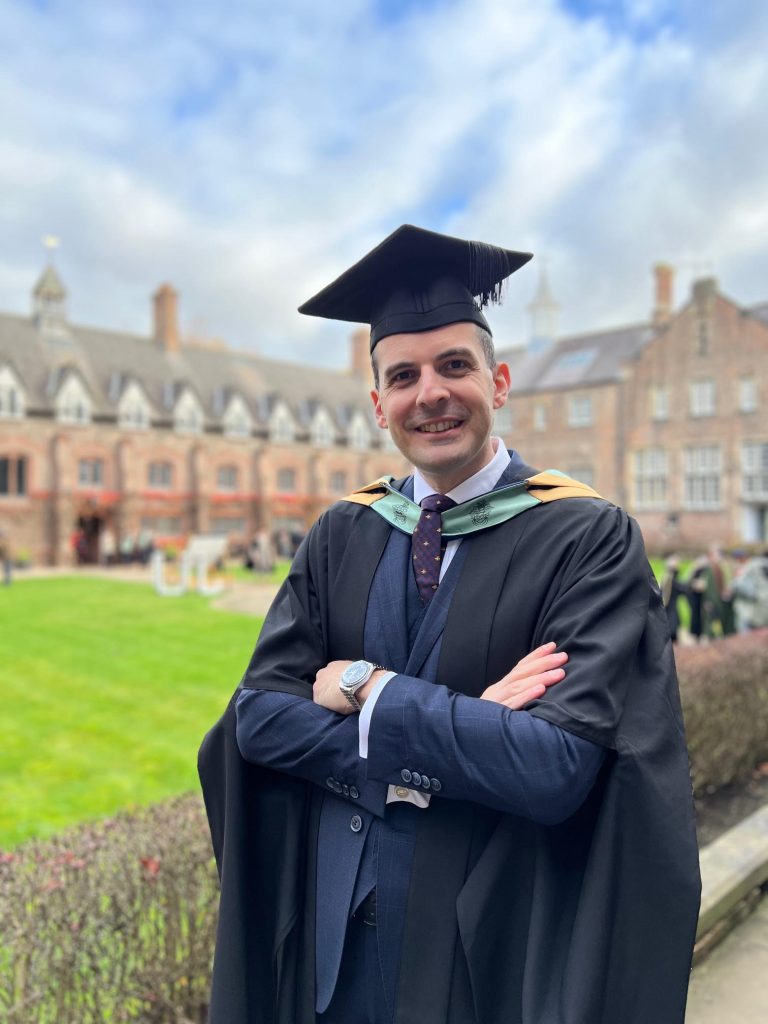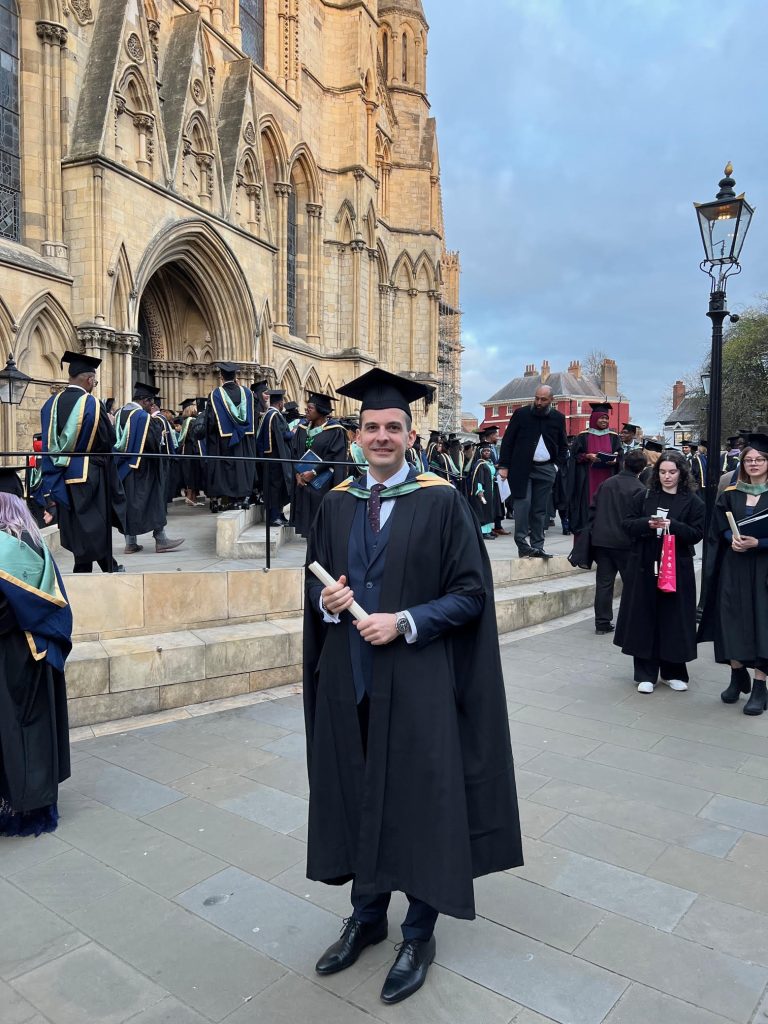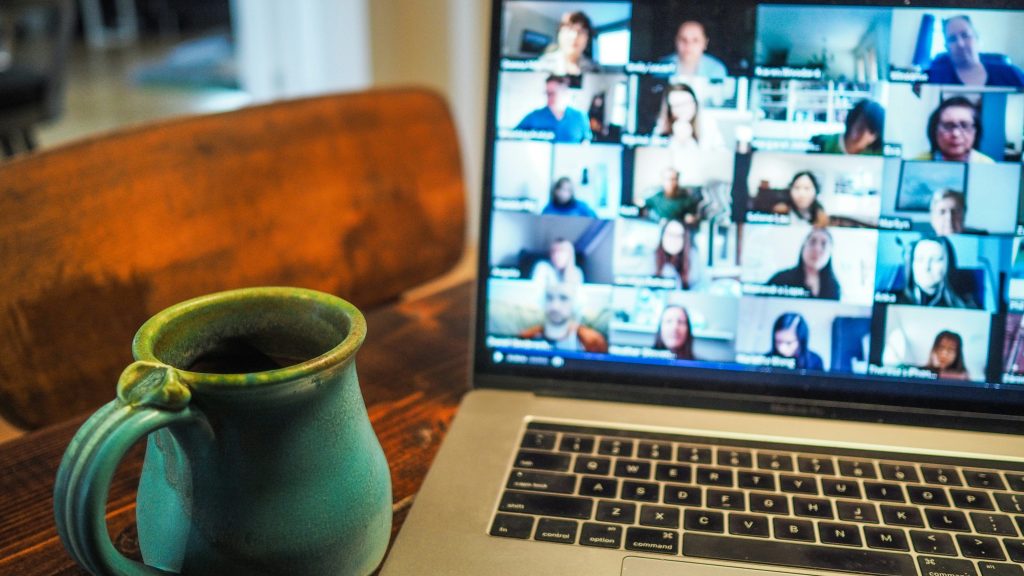The holiday season is a time of joy, connection, and reflection, and what better way to celebrate it than by hearing directly from students about their unique experiences? From festive traditions and creative gift ideas to moments of relaxation and personal growth, students bring fresh perspectives to this special time of the year. The holiday season is a time of joy, reflection, and celebration—and here at RKC, we’re wrapping up the year with gratitude for our incredible students.
In this blog, recent RKC graduate Fabio shares how he celebrates, unwinds, and prepares for the year ahead. From career growth to cherished family traditions, discover how his RKC journey has enriched both his professional and personal life. Get inspired and embrace the festive spirit through his heartwarming story!

Which programme did you study?
MBA Innovation Leadership and consulting at Robert Kennedy College in exclusive partnership with York St John University
What motivated you to pursue your degree online?
I took advantage of my time off during the pandemic. As an airline pilot, I was idle for a year in 2021, which provided a perfect opportunity to start studying for a degree, thanks to the extra time available. This allowed me to achieve my long-standing goal of earning a degree while preparing for potential future opportunities in an office-based role. Additionally, it was a great chance to broaden my knowledge in leadership and teamwork skills I apply daily in my work. I was also eager to delve deeper into corporate strategy and processes to enhance my understanding of organisational dynamics.
Which courses or subjects did you find most engaging, and why?
I found the module “Building and Leading High-Performing Teams” the most engaging because it closely aligned with my leadership role as an Airline Captain. The module’s focus on the dynamic interplay between leadership and followership, coupled with strategies to elevate team performance to optimal levels, was particularly impactful for professionals like me, tasked with high-stakes decision-making and coordination. Delving into these intricate dynamics and learning to guide a team to achieve peak performance was inspiring and profoundly relevant to my professional responsibilities. Furthermore, as part of the module, we participated in a group exercise where we delivered a group presentation, which allowed us to put our studies into practice, reinforcing the concepts and enhancing our collaborative skills.
Which module or subject was the most challenging for you, and how did you approach it?
I faced two particularly challenging modules for different reasons. The first, ‘Mastering Strategic Consulting,’ was challenging as it was my first university module after a 15-year break from education. I struggled with finding an effective study method and organising tasks. However, the university’s ‘The Seven Habits of Highly Effective Assignment Writers’ material was incredibly helpful in getting me back on track. The second challenge was the last module, ‘Successful Strategic Thinking.’ By then, the aviation industry had recovered, and my work became very demanding, leaving me with little time for assignments. Despite this, the discipline I developed in earlier modules helped me maintain a daily routine of reading and writing, even if it was just for a few minutes each day. This steady approach led me to a rewarding conclusion.

Can you tell us more about the award you received? What does it mean to you personally and professionally?
The awards I received, the MBA in Innovation Leadership and Consulting with distinction and the surprise Subject prize in ‘Business’, hold significant personal and professional meaning. It is a validation of the hard work and dedication I put into my studies after returning to education after 15 years. Managing a busy work schedule alongside academic responsibilities made the journey challenging, but the distinction and prize are a testament to my perseverance and commitment throughout the programme. It’s a meaningful recognition of my efforts and growth during this period. Professionally, this recognition boosts my confidence and provides further motivation to pursue my goals in leadership and business. It also acknowledges the skills and knowledge I have developed, reinforcing my credibility in my field. The award strengthens my professional identity and opens doors for new opportunities, whether advancing in my current role or exploring new challenges.
What skills or knowledge gained during your studies do you feel will be most valuable in your professional life?
Reflecting on my academic journey, some acquired skills and experiences stand out as particularly valuable for my professional life:
Critical Thinking and Intellectual Growth, efficient time management, and resilience have equipped me to approach complex problems strategically and make well-informed decisions. I anticipate leveraging them in roles that require strategic leadership, innovative problem-solving, and collaboration under pressure.
Effective Productivity Management, by balancing academic demands with a busy work schedule, taught me to prioritise tasks, set realistic goals, and maintain a disciplined schedule. Breaking down large projects into manageable steps proved essential for sustaining momentum, a methodology I can confidently apply to professional environments.
Perseverance in overcoming challenges was a transformative experience. I learned the importance of persistence in achieving long-term goals, strengthening my ability to stay focused despite adversity.

Are there any strategies or tips you found particularly useful that you would recommend to others?
- Do not Procrastinate.
- Read and write from day one of the module.
- Submit the mid-module draft as complete as possible to get more thorough feedback.
- Have a study buddy from your course to talk about lessons.
- If you have any doubts, Ask!
- After completing the assignment, ‘let it rest’ for 5-7 days and return to it with a fresh mind before submitting it. You will notice details/errors that you didn’t before.
- Finally, enjoy the process!
Lastly, how did you manage studies during holiday season?
During my academic journey, I found myself in the middle of a module while on my Christmas holidays, which made studying challenging due to the festivities and family commitments. However, with some planning, I managed to balance both. I kept it simple, I left the main holiday days from the 24th to the 26th of December free to enjoy with family, while on the others I planned to study 2 hours every morning after waking up to enjoy the rest of the day guilt-free. Slowly but steadily. At this time of the year, I had to be realistic, I couldn’t push too hard on studying alone as time with family and friends was very important. Setting a realistic goal every day was key to maintaining balance.
As Fabio’s story shows, the holiday season is a time for reflection and future planning. Ready to take the next step in your academic and professional journey? With flexible online applications and a world-class learning environment, your future starts here. Apply online today and let this holiday season mark the beginning of your journey toward excellence!


























